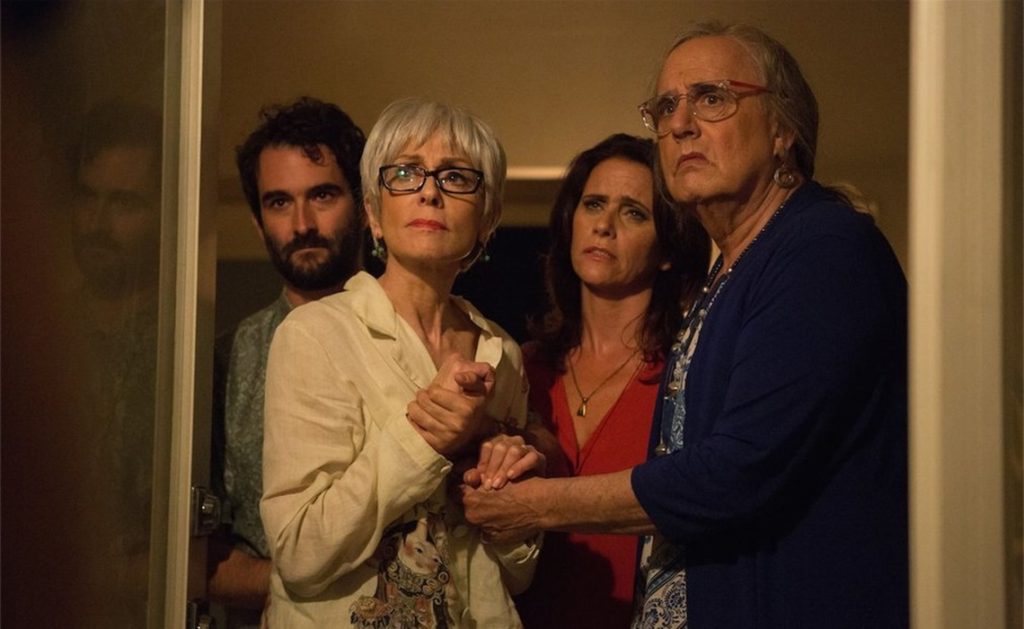Transitioning is an incredibly difficult journey even under the best of circumstances. The highs of living out of the closet often contrast with the struggle for acceptance that far too many transgender people experience. Markie in Milwaukee documents ten years of turmoil that one transgender woman faced, coming to grips with her identity against a backdrop of an incredibly unsupportive community.
Markie Wenzel is a woman stuck between two worlds, facing a choice few ever have to consider. She’s an upbeat, soft-spoken person with a pleasant demeanor, if not a little socially awkward. Her height, close to seven feet, led to bullying at an early age, something that hardly let up as she began her transition in the mid 2000s.
As a minister in a fundamentalist Christian church, Markie encountered quite a lot of pushback from her community as she began to present as female. Her family all but abandoned her, refusing to accept a hiccup in an otherwise happy life.
The film offers a broad lens to examine Markie’s life at the various stages of transition, including the point where she decided to stop and return to life as Mark, a decision that was rewarded in the form of family visits, including a new granddaughter. Markie’s church took her back, basking in the glory of a sinner come to repent for the crime of being born different.
Markie in Milwaukee operates on an entirely different narrative wavelength than its subject, a moving narrative that highlights the many conflicts that transition brings out. Director Matt Kliegman largely lets Markie speak for herself, but the framing of the documentary often suggests that he’s at odds with the statements coming from Markie. The film carries the feel of belonging to Markie, but the audience is given plenty of leeway to suggest that there’s more beneath the surface that she’s not quite ready to tackle.
Kliegman puts the audience in a challenging position with regard to how to process Markie’s choices. Generally speaking, it’s considered inappropriate to second-guess the way a transgender person explains their identity. It is impossible to watch Markie in Milwaukee and not do just that.
This dynamic is most on display in scenes highlighting Markie’s church and her family. Despite a few efforts by Markie to suggest her detransition was not fueled by religious pressure, she contradicts herself on a few occasions. The footage from her church and children’s home demonstrates the intrinsic link between the two.
In all her years of transition, Markie found acceptance in the form of support groups and friendly strangers out in public. She didn’t appear to develop any meaningful connections beyond those surface level relationships. That kind of isolation is bound to be tough on anyone.
The saddest aspect of the film is the way in which Markie lives her life believing that she’s caused all this damage to her family. To say that that’s their problem, not hers, is an accurate reflection of the situation, yet Markie’s life is not improved by the notion that her identity shouldn’t be a burden on anyone else. For too many transgender people, the idea that our lives are an abomination is allowed to fester, tearing away at one’s psyche.
As a transition narrative, Markie in Milwaukee would have been improved by a stronger focus on the decision to embrace her old identity again. Kliegman touches on the subject a few times, most notably in a conversation between Markie and her therapist. One can certainly understand the sensitive nature of the subject matter, but the resolution to Markie’s story leaves more questions than it probably needed to.
Markie in Milwaukee is a flawed narrative, but a vitally important one in today’s climate. In many ways, Kliegman’s film is most valuable to the family members of transgender people, serving as a cautionary tale for the road that too many loved ones have to face alone. Markie Wenzel has been dealt a raw hand in life, but her story can help future generations to avoid the same hardships.












